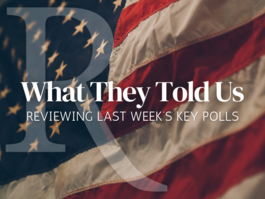Voters Call for Special Prosecutor to Investigate FBI
Voters think a special prosecutor is needed to see if the nation’s top cops have been playing politics.

Voters think a special prosecutor is needed to see if the nation’s top cops have been playing politics.

It's elementary. Education control freaks will use any excuse to crack down on competition. With two million K-12 students now educated at home (including our 9th grade son), the temptation to exploit the most marginal cases of alleged child abuse by home-schoolers has proven irresistible to statist politicians and government apologists.

Will rising tensions between the state of California and the federal government push the so-called "Calexit" initiative over the finish line? Most Americans hope not.

With the opening of the first all-automatic grocery store, Amazon Go, Americans worry the tech giant will eventually take over the retail sector and force out both smaller and larger businesses.

Last week, the founders of “New California” read their Declaration of Independence in a hopeful step toward eventual statehood.

In the devastating aftermath of Hurricane Maria, Puerto Rico is pushing even harder for statehood, and more Americans than ever support welcoming the commonwealth as the 51st state. They’re far less likely to support statehood for our nation’s capital, though.

"The Western democratic system is hailed by the developed world as near perfect and the most superior political system to run a country," mocked China's official new agency.
"However, what's happening in the United States today will make more people worldwide reflect on the viability and legitimacy of such a chaotic political system."

Thirty-nine percent (39%) of Likely U.S. Voters now think the country is heading in the right direction, according to a new Rasmussen Reports national telephone and online survey for the week ending January 18.

Democrats have been complaining recently about President Trump’s physical and mental health, but his White House physician who also worked for President Obama blew those concerns away at a press conference. His political opponents, however, aren’t buying it.

Here is a MAGA riddle: What is even worse than Fake News? That’s right. Flake News.

Several black members of Congress have been calling for President Trump's impeachment for months and now are boycotting his upcoming State of the Union speech over his criticism of Haiti and some nations in Africa. But very few voters think this continuing confrontation is good for the black community.

President Trump is under fire and we're all "shocked" that his s---hole mouth called the (predominantly black) nations of Africa "s---holes," helpfully comparing them to (predominantly blonde) Norway to make sure nobody missed the point. To drive home just how angry people are about this (and rightly so), Trump's comment overshadowed news that the government accidentally told the citizens of Hawaii they were about to get nuked. As George W. Bush would say, "that's some weird s---."

At the end of a week in which stock markets continued their record roar and Senate Democrats growled the necessity of tying a government funding deal to support for DACA, Congress voted late last night against stopgap funding to keep government open.

Now that Donald Trump, accused by many of his detractors of being racist, has replaced America’s first black president, more voters think the government’s not doing enough to improve conditions for America’s black youth, though they think they’re ultimately responsible for improving their own situation.

As we reach, gingerly, the anniversary of Donald Trump's inauguration as president, none of the disasters feared by critics has come to pass. The economy has turned at least mildly upward rather than plummet to depression. The executive branch has obeyed court orders. No military disaster has occurred. Fears that seemed plausible to many have proved unjustified.

American workers are more confident than ever that they will get a salary boost in the near future, and most continue to believe the best opportunity for career advancement is to stay put.

The war for dominance in the Middle East, following the crushing of ISIS, appears about to commence in Syria -- with NATO allies America and Turkey on opposing sides.

Illegal immigration continues to be a hot-button issue in Congress, but fewer Americans now feel threatened that illegal immigrants are taking their jobs.

Prominent Democrats are now accusing President Trump of being a racist for championing the bringing of higher educated, more skilled immigrants to America, and voters tend to believe they’re right.

With a number of states planning ways to tighten their Medicaid and food stamp rolls, Americans continue to believe that too many count on the government for cash and that government welfare programs hurt more than they help.